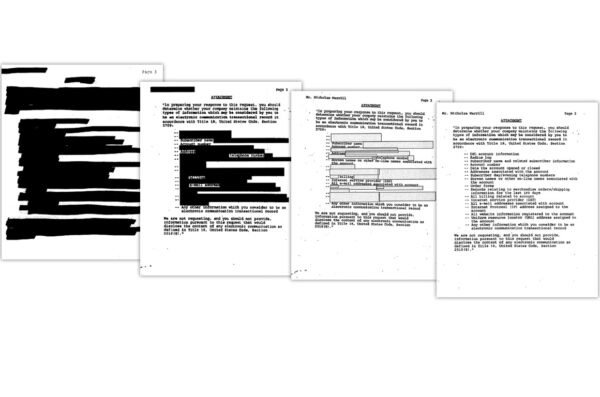Court Rules FBI Can Continue To Silence National Security Letter Recipient
Internet Service Provider Still Can't Speak About Secret FBI Demand For Records Issued More Than Five Years Ago
FOR IMMEDIATE RELEASE
CONTACT: (212) 549-2666; media@aclu.org
NEW YORK – A federal court today ruled that the government can continue to enforce a five-year-old gag order on an Internet service provider (ISP) that the FBI served with a national security letter (NSL) many years ago. The ruling came in a lawsuit brought by the American Civil Liberties Union and the New York Civil Liberties Union on behalf of the ISP. Under a Patriot Act provision, the FBI can use NSLs to demand personal records about innocent customers from ISPs, financial institutions and credit companies without prior judicial approval, and then bar NSL recipients from disclosing anything about the record demand.
"We're deeply disappointed that the court ruled that the FBI can continue to gag our John Doe client, who has been silenced for more than five years," said Melissa Goodman, staff attorney with the ACLU National Security Project. "This gag – which we continue to believe is unnecessary and unconstitutional – has prohibited Doe from participating in the public debate about the Patriot Act and has been used to suppress key information about the FBI's misuse of NSLs. The FBI's overuse of the NSL gag power has allowed the FBI to manipulate the surveillance debate and to deprive Congress and the public of crucial information that would inform the ongoing congressional debate about this intrusive surveillance power."
In addition to ruling that the FBI could continue to enforce its long-running gag on John Doe, the court also ruled that the FBI can continue to suppress an "attachment" to the NSL Doe received. The ACLU argued that the attachment, if disclosed, would show that the FBI tried to obtain records that it was not entitled to obtain under the NSL statute.
Because the FBI imposed a gag order on the ISP, the lawsuit, now called Doe v. Holder, was initially filed under seal, and even today the ACLU is prohibited from disclosing its client's identity. The FBI continues to maintain the gag order even though the underlying investigation is more than five years old and even though the FBI abandoned its demand for records from the ISP over two years ago.
In December 2008, the U.S. Court of Appeals for the Second Circuit ruled that parts of the NSL statute's gag provisions were unconstitutional, specifically the sections that wrongly placed the burden on NSL recipients to challenge gag orders, narrowly limited judicial review of gag orders and required courts to defer entirely to the executive branch. The court of appeals sent the case back to the U.S. District Court for the Southern District of New York and ordered the government to justify the constitutionality of the gag on Doe. In June 2009, the government submitted its justification for the gag on Doe entirely in secret, in a classified declaration that even Doe's ACLU attorneys couldn't see. While the district court ordered the government to produce an unclassified summary, most of the evidence used to justify the continued gag on the ISP remains a secret.
"Continuing to impose a blanket gag order on our Doe client places a serious burden on his First Amendment rights. It is important that NSL recipients – those with first-hand knowledge of the FBI's actual use and abuse of its NSL power – be allowed to speak out," said Larry Schwartztol, staff attorney with the ACLU National Security Project.
Bills are currently pending in both the House and Senate that would amend the NSL gag by requiring the government to convince a court that a national security gag order is necessary.
Attorneys on the case are Goodman, Schwartztol and Jameel Jaffer of the ACLU National Security Project and Arthur Eisenberg, Legal Director of the NYCLU.
Today's ruling is available online at: www.aclu.org/safefree/nationalsecurityletters/41311lgl20091020.html
More about the case is at: www.aclu.org/safefree/nationalsecurityletters/22023res20051130.html


